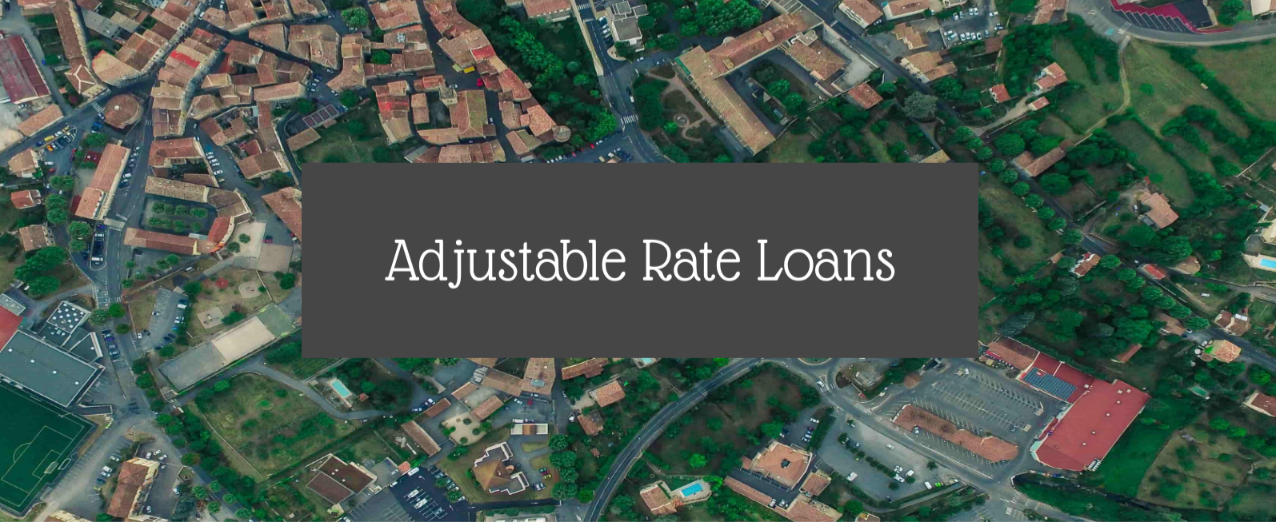What Is An Adjustable Rate Loan?
An adjustable rate loan is a loan where the rate of interest charged can change or 'adjust' during the life of the loan. An adjustable rate loan is the opposite of a fixed interest rate loan where the interest rate remains fixed during the loan. Adjustable rate loans are much less common than its fixed interest counterpart because individuals and families value the consistency and fixed payments that a fixed interest loan offers.
You see, with an adjustable rate mortgage, as interest rates rise(or lower), so does the periodic or monthly payment that the borrower pays. The length of the loan amortization schedule doesn't change, only the payment amount. This presents a risk to the borrower if interest rates rise. The risk that interest rates may rise is called 'interest rate risk' and it's a risk that is assumed by the borrower if they choose an adjustable rate loan. On the other hand, if a borrower chooses a fixed interest rate loan, then the lender is assuming the interest rate risk.
So what is the disadvantage of a fixed interest rate loan? Well, in order for the lender to take on the interest rate risk, they charge a premium on the interest rate to compensate for the risk. Thus, an adjustable interest rate is typically lower than a fixed interest rate because with an adjustable rate, the one borrowing the money is assuming the interest rate risk.
Determining The Adjustable Interest Rate
How is the interest rate on an adjustable rate loan determined? The interest rate will generally be tied to an indexed interest rate. Typically, this is something called the LIBOR rate...which stands for London Interbank Offered Rate. The loan interest rate the borrower pays is usually LIBOR plus a certain amount of interest above the LIBOR rate. So as LIBOR increases or decreases, so will your interest rate and your loan payments.
Advantages of Adjustable Rate Loans
As we've just stated above, the primary advantage of an adjustable rate loan is the rate of interest charged will be lower than a fixed interest rate loan, with all else being equal. The only other advantage is that if the market interest rates are decreasing, then the person with the adjustable interest rate loan will get to take advantage of the decrease in interest rates. But buyer beware, the opposite will be true if interest rates are increasing. Beyond these two things, the advantages compared to a fixed interest rate loan are limited. But these are two important advantages to consider.
Types of Adjustable Rate Loans
Adjustable rate loans come in all shapes and sizes....and truth be told, most of them are a hybrid between a fixed interest rate loan and an adjustable rate loan or mortgage. This means they start out for a period of time as fixed loans and then change into an adjustable rate after the set period of time is over. And just for reference, ARM stands for adjustable rate mortgage.
10/1 ARM: The 10/1 ARM has a fixed interest rate for the first 10 years and then adjust with the market interest rate each year after that.
7/1 ARM: The 7/1 ARM has a fixed interest rate for the first 7 years and then adjusts with the market interest rate each year after that.
5/1 ARM: The 5/1 ARM has a fixed interest rate for the first 5 years and then adjusts with the market interest rate each year after that.
1 year ARM: The 1 year arm has a fixed interest rate for the first year and then adjusts with the market interest rate each year after that.
How Do Interest Rate Adjustments Work?
There are certain things you should know about how the interest rate adjustments take place. These terms will vary from loan to loan. First, when applying for an ARM, be sure to ask what the maximum interest rate cap is. This is the maximum interest rate that can be charged on the ARM. Second, generally there is a maximum amount that the interest rate can rise each year. This should give the borrower some comfort knowing that a spike in interest rates one year can only be a maximum amount.
Conclusion
There are clear advantages to adjustable rate loans, those advantages being lower interest rates and lower payments. However, the adjustable rate loan may not be the best if you want to know exactly what you monthly payment will be during the entirety of your loan. Be sure to talk through the loan options with your loan or mortgage broker before choosing the loan that best suits you.
IQ Calculators hope you find this article useful. We are the number one financial calculator site on the web.

